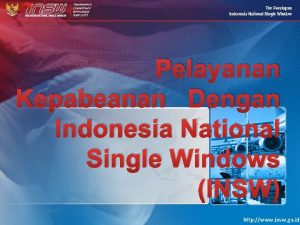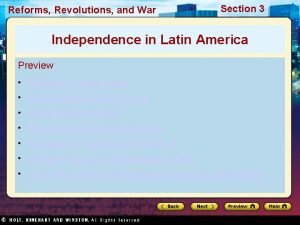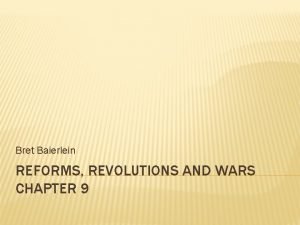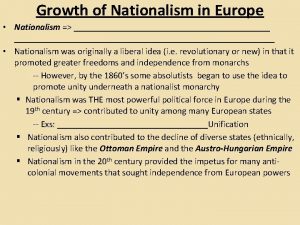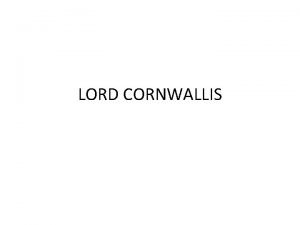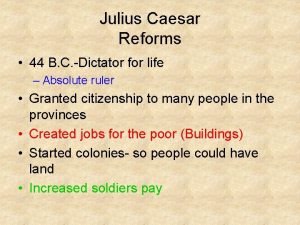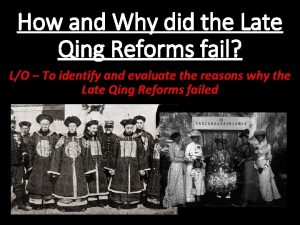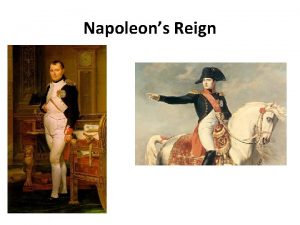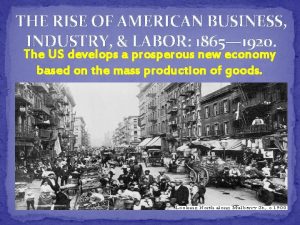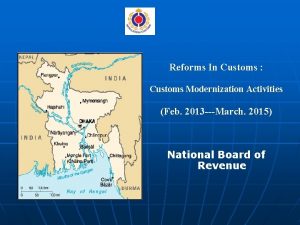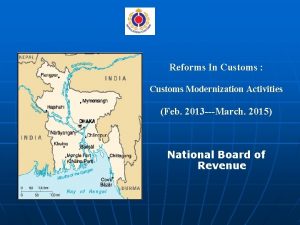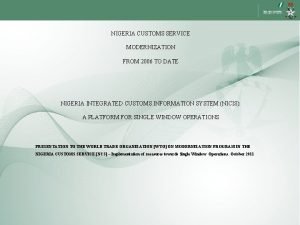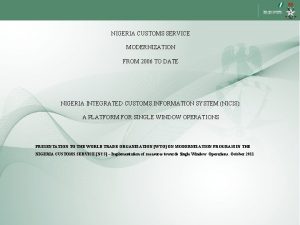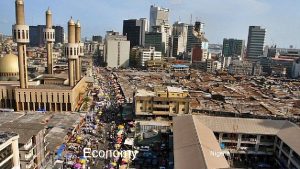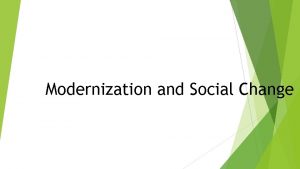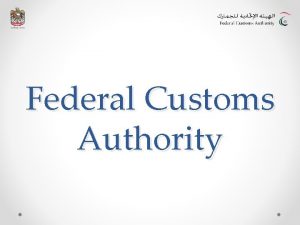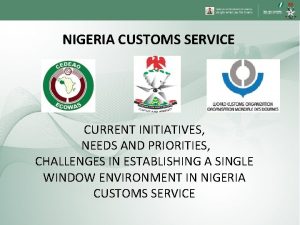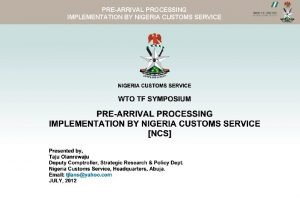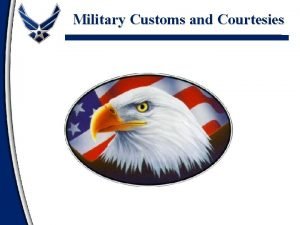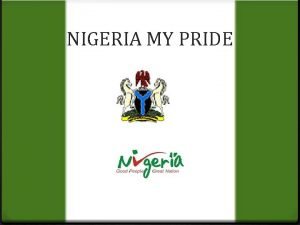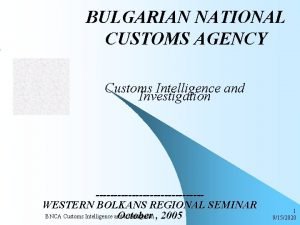NIGERIA CUSTOMS SERVICE REFORMS AND MODERNIZATION IN THE

























- Slides: 25

NIGERIA CUSTOMS SERVICE REFORMS AND MODERNIZATION IN THE NIGERIA CUSTOMS SERVICE A Paper presented by ACG Julius Nwagwu 17 Th February, 2011

Reforms and Modernization in Nigeria Customs Service § § § Introduction. Establishment of the Customs Service. Processes and Procedures (ASYCUDA). Infrastructures. Capacity Building – Training, Welfare, Recruitment, etc.

Reforms and Modernization in Nigeria Customs Service § § Equipment and Tools. Benefits Derived. Challenges. Customs of the 21 st Century – Way Forward.

Reforms and Modernization in Nigeria Customs Service § Introduction We shall take a historical perspective of the reforms and modernization in NCS so as to appreciate the achievements recorded so far. The paper shall however highlight early reforms within the NCS. It shall elaborate on the reforms of the present Customs Service so as to chart the course for Customs of tomorrow.

Reforms and Modernization in Nigeria Customs Service § Establishment of the Customs Service in Nigeria This dates back to 1891 under the colonial administration. T. A. Wall was appointed the first Director General. The Law governing the functions and duties of NCS are contained in the CEMA No 55 of 1958, now cited as Cap C 45 of 2004, Laws of the Federation of Nigeria [LFN].

Reforms and Modernization in Nigeria Customs Service § The core functions and duties basically are: I. Collection of Revenue from Customs and Excise and Accounting for them in a manner as may be directed. II. Anti-smuggling activities so as to achieve (i) above and safeguard the country from dangerous imports or exports.

Reforms and Modernization in Nigeria Customs Service § NCS plays vital role in the Economic Development of the country. § To cope with the increasing challenges of economic development, NCS has undergone various reorganizations to ensure efficient performance.

Reforms and Modernization in Nigeria Customs Service § The 1975 – 1979 Reforms • The Reform was structural, merging the technical and preventive units for improved performance. § The 1985 – 1989 Reforms • NCS was transferred from the Federal Ministry of Finance [FMF] to the Federal Ministry of Internal Affairs. • The Customs, Immigration, Prison Board was established.

Reforms and Modernization in Nigeria Customs Service § The 1988/89 – 1994 Reforms • The government returned NCS to FMF with the creation of NCS Board in 1992. § The 1994/95 – 1999 Reforms • A General of the Nigerian Army, S. O. Ango was appointed Sole Administrator. • A major achievement of this administration was the replacement of the Long Room with the Customs Processing Centre (CPC).

Reforms and Modernization in Nigeria Customs Service § The regime also midwifed the introduction of the Automated System for Customs Data [ASYCUDA] which was then being implemented on behalf of UNCTAD by ECOWAS-CCC. § The Professional Import Duty Administrators (PIDA) were engaged to complement Customs in the task of Revenue collection.

Reforms and Modernization in Nigeria Customs Service § The 1999 - 2004 Reforms • A career Customs Officer, A. A. Mustapha, was appointed the Comptroller-General of Customs. • The ongoing reforms and modernization began in earnest during this regime with the full implementation of the ASYCUDA.

Reforms and Modernization in Nigeria Customs Service § ASYCUDA • The competing demands of trade facilitation and controls in the International Supply Chain to detect Customs fraud and offences necessitated the need to strike a balance between the two interests. • ASYCUDA procedure provides NCS with the Automated controls of cargo across borders within a framework of laws, regulations and processing of Customs clearance. • Migration from ASYCUDA 2. 7 to 3. 0 (++). • Full implementation of the Nigeria Integrated Customs Information System (NICIS) which alongside the ASYCUDA provide the platform for a Single Window operation in the clearance process.

Reforms and Modernization in Nigeria Customs Service § Achievements to date • Infrastructures Ø Customs offices renovated to meet with the modern office standards. Ø CPCs are now open space yet with physical separation between Declarants and Customs, which has largely reduced human contact between officers and stakeholders.

Reforms and Modernization in Nigeria Customs Service Ø Modern and befitting Corporate Headquarters is almost completed. Ø The Customs Training Colleges at Ikeja and Kano have been renovated such that the trainees can now be accommodated in very modern hostels. The classrooms also can now boast of modern teaching aids and equipment.

Reforms and Modernization in Nigeria Customs Service § Communication • NCS now operates a central Server system (NCS network) at the Headquarters, which enables; Ø Warehousing of all Import, Excise, Transit and Transshipment data. Ø Interconnectivity with FMF, CBN, NBS, NAFDAC, FIRS, SON, Scanning Service Providers, Terminal Operators etc.

Reforms and Modernization in Nigeria Customs Service Ø All Designated Banks, Declarants, Cargo Carriers, DTI Café operators can now also connect to the central server. Ø The Wi-Fi technology is being test-run to further enhance declaration processing and connectivity. § Operations; • There is now a new workflow to enhance processing of Customs clearance documents.

Reforms and Modernization in Nigeria Customs Service • The new CET Tariff usage is further enhanced. • Transition from PSI to DI is now well grounded and the services of Scanning and Risk Management Service companies are better appreciated. • Strategic Plan for the future Customs developed by a WCO Diagnostic Mission to Nigeria. • Other areas of assistance by the WCO include Training Need Analysis and Time Release Studies.

Reforms and Modernization in Nigeria Customs Service • e-Payment through the Designated Banks achieved. • e-Submission of Forms M and Risk Assessment Report [RAR] to the Customs. • e-manifest submission right from foreign enabled. • sms information to NAFDAC for regulated cargoes for necessary certification. • e-remittance on-line, real time from Duty Collecting Banks to CBN.

Reforms and Modernization in Nigeria Customs Service § Capacity Building • A critical index of Customs reforms and modernization is Training. This Administration has vigorously pursued training of all categories of officers to equip them in line with the modernization efforts. • Accession to the various conventions and being signatory to agreements e. g. Kyoto, ACV, Framework of Standards on the platform of membership of the WCO has provided relevant tools for enhancement of capacity of the officers. • In the area of welfare, the officers have been greatly motivated through salary increase, bonus and housing packages.

Reforms and Modernization in Nigeria Customs Service • Recruitment of new officers and men to reinvigorate the work force. § Tools and Equipment • To enhance productivity of the officers and men, the following have been put in place; Ø Aircrafts Ø Boats Ø Vehicles Ø Arms and Ammunitions

Reforms and Modernization in Nigeria Customs Service Benefits Derived Better human resource utilization. Increased Revenue collection. Noticeable improved compliance with laws and regulations. • Improved relationship between Customs and Trade. • Reduction in time of clearance of goods. • Lower transaction costs. § • • •

Reforms and Modernization in Nigeria Customs Service § Challenges • Increase in volumes and complexities of International Trade. • Need to protect the nation from unfair international trade practices. • Increase in public expectation from Customs. • Demand for increased Revenue collection. • Low compliance level by the trade.

Reforms and Modernization in Nigeria Customs Service § Customs of the 21 st Century – Way Forward • Globalization and other strategic drivers necessitate a new approach towards meeting the speedy movement of goods across borders. The building block for the Strategic Directions as espoused by the Secretary General can be summed up as follows: Ø Globally Networked Customs. Ø Better coordinated Border Management.

Reforms and Modernization in Nigeria Customs Service Ø Intelligence-driven Risk Management. Ø Customs-Trade partnership. Ø Implementation of modern working methods, procedures and techniques. Ø Enabling technology and tools. Ø Enabling powers. Ø A professional, knowledge-based Service culture. Ø Capacity Building. Ø Integrity.

Reforms and Modernization in Nigeria Customs Service Thank you very much
 Filosofi customs services dan customs controls
Filosofi customs services dan customs controls Reforms revolutions and war answer key
Reforms revolutions and war answer key Wars revolutions and reforms
Wars revolutions and reforms Modernization and globalization difference
Modernization and globalization difference How do the governments of kenya and nigeria compare?
How do the governments of kenya and nigeria compare? Abbu bl
Abbu bl Tanzimat reforms definition
Tanzimat reforms definition Spindle fibers
Spindle fibers Why did the propaganda movement fail
Why did the propaganda movement fail Higher history essay example
Higher history essay example Tanzimat reforms definition
Tanzimat reforms definition What economic reforms did the populist party call for?
What economic reforms did the populist party call for? Education sector reforms in pakistan
Education sector reforms in pakistan Ncf curriculum framework 2005
Ncf curriculum framework 2005 Lord cornwallis introduced
Lord cornwallis introduced Caesar reforms
Caesar reforms Late qing reforms
Late qing reforms Reforms in the antebellum period
Reforms in the antebellum period Antebellum reforms apush
Antebellum reforms apush New education reforms in sri lanka in sinhala
New education reforms in sri lanka in sinhala Npqml project example
Npqml project example Napoleons reign
Napoleons reign Future of financial advice reforms
Future of financial advice reforms Corporate governance reforms in india
Corporate governance reforms in india Triangle shirtwaist factory fire led to which reforms
Triangle shirtwaist factory fire led to which reforms Simla deputation meaning in urdu
Simla deputation meaning in urdu
